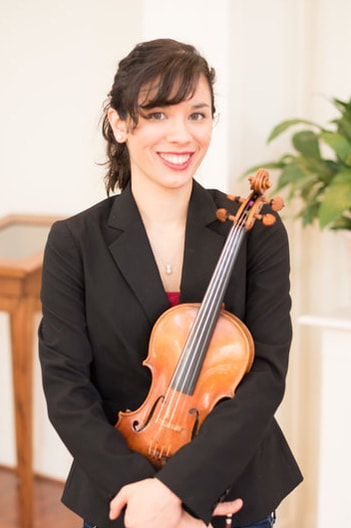Part of this was a practical choice on my part when starting my career: when you graduate from Peabody with $90K in student loans, you need a steady income. Fast. I tried to fit performances in when I could, but I put all my energy into building my studio and paying down my debt.
Part of this was playing to my strengths: I have a lot of experience teaching. I'm good at it. I like playing around with the internet and figuring out ways to use it to connect with people through music.
Part of this was just because I don't like auditions. After two years in a high-pressure music school, I wanted some time where I wasn't being compared to other violinists. Auditions are stressful. And when you're trying to release physical tension in your playing, you need low-pressure performances where you set yourself up for success, not auditions.
Fast forward two years later. I have an advanced student, a senior, taking the Senior Regional Orchestra audition. She has to play excerpts. I have a junior whose orchestra teacher uses the SRO excerpts for their seating placements at school. And I have an 8th grader auditioning for the Junior District orchestra - yep, excerpts. It seems that excerpts and orchestra have finally caught up to me. The Universe has made it pretty clear to me that to succeed as a teacher, I need to be able to teach excerpts. And to teach excerpts, I need to be able to play them.
About this same time, a friend of mine told me about a local orchestra having sub auditions, and I sent in my resume. I figured if nothing else, it would give me something to practice for. I'd taken this audition once before, with disastrous results. My heart rate accelerated, my body locked up, sweat poured from my palms and I just choked in the audition room.
But, I figured this time would be easier. And it was. The list was the same, so I had a leg up on learning the pieces. I felt at least a little more confident. Audition day arrived, and my heart rate accelerated (but less so than last time), I managed to unlock my body enough to actually move my bow some of the time, and I was able to stay present enough in my mind to have SOMETHING of a musical experience in the room.
Unfortunately, "better" in this case wasn't enough to make the sub list. Some of my friends who took the same audition did make it in, though. I plunged into a very dark place in my mind, a place of comparison and despair I hadn't been in years. I replayed the audition in my mind. I beat myself up for my lack of focused practicing. I picked apart my fundamentals and lamented my natural tendency to manifest tension physically. I called my best friend and sobbed. I talked to some mentors. Finally, I put in my copy of the Empire Strikes Back in the DVD player and enjoyed an evening on the Dark Side.
The next day, I took my notebook and I wrote down, in detail, everything that had happened in the audition room. And I made a plan.
You see, an audition is a mirror. It's like the dreaded 360-degree mirror in the show What Not To Wear. It shows you ALL of the imperfections in your playing, in excruciating detail. If you have weaknesses, they will come out in an audition. Even if you have weaknesses you think you've corrected or strengthened, they can come back in these situations. It is an emotional experience to look in this mirror, to have your playing on display and to see your flaws reflected back at you.
Based on my (albeit limited) experiences, here are a few tips to help you through an audition experience:
- Over-prepare. You cannot possibly be prepared enough. Practice hard, and practice smart.
- Play mock-auditions. As closely as possible, simulate the conditions. Ask your friends and family to act as a panel for you. Play in front of people who make you nervous. No matter how un-fun this is, do it anyway. This way, your performance nerves on the audition day won't catch you off guard.
- Keep yourself focused on your own playing. Don't let your friends (especially friends who may be taking the same audition!) or colleagues distract you. Do what YOU need to do to focus.
- Remember, you're making music.
- Afterwards, have someone you feel comfortable with who you can call, and let yourself have some down-time to just be you to recover.
- Let yourself feel whatever it is you feel when you hear the results. You won't be able to fully process the experience until you feel it - so grab a box of tissues and let it out.
- Within 24 hours of the audition, make notes about what happened to your playing - both things that went well, and places where your nerves/musicality/technique broke down.
- Figure out strategies to strengthen your weaknesses, and choose new material to learn to work on these things.
- Remember, there will always be another orchestra audition and new opportunities - you will learn and grow from your experience, and your family and friends will still love you regardless of the audition results. And if they don't, you may need some new friends.
That's all for today. Be well, my friends, and enjoy this new year!
Love,
Claire

 RSS Feed
RSS Feed